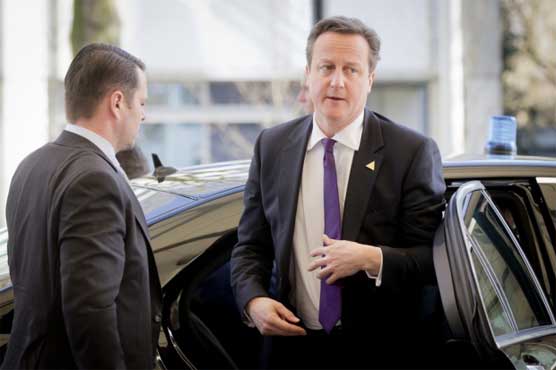Britain raises terror threat level on Iraq, Syria fears

The increase in the threat level comes ahead of a NATO summit.
LONDON (AFP) - Britain raised its terror threat risk level to "severe" on Friday because of fears over the situation in Iraq and Syria, meaning an attack is thought to be "highly likely".
The move following the killing of US journalist James Foley, apparently by a man speaking with an English accent who belonged to the jihadist group Islamic State (IS).
While there was no intelligence to suggest that an attack was imminent, Prime Minister David Cameron said there was "no doubt in my mind" that IS had its sights set on targets in Europe.
"What we are facing in Iraq now with ISIL (IS) is a greater and deeper threat to our security than we have known before," he told a press conference just after the threat level was raised.
"We are facing a terrorist organisation not being based in a country but seeking to establish and then expand its own terrorist state."
The increase in the threat level comes ahead of a NATO summit being hosted by Cameron s government in Wales from next Thursday.
The threat level is now at the second highest level out of five possible categories and is at its highest since July 2011.
Cameron said he was to give a statement to parliament on Monday about planned new laws cracking down on British would-be jihadists.
These include removing passports more easily from people suspected of wanting to travel to fight in Iraq and Syria or returning from there.
- Fears over Syria-bound fighters -
IS posted a video last week in which a masked militant with a London accent is seen executing Foley, who had been missing since his capture in northern Syria in 2012.
There is growing concern in Cameron s government that, as well as travelling to fight abroad, British passport holders heading to Iraq and Syria could return to commit attacks on British soil.
More than 500 Britons have travelled to Syria or Iraq to fight with jihadists in the last few years, according to the intelligence services.
Ministers are also under pressure to step up action to prevent the radicalisation of young Muslims in Britain.
Anti-terrorism police this week urged Britons to identify "aspiring terrorists" among family members, friends and neighbours.
British police made 69 arrests in the first half of 2014 on suspicion of offences including travelling abroad for terrorist training, preparing acts of terrorism and fundraising for terrorist activity.
Police said they would be increasing the number of visible patrols as well as implementing other unspecified security measures from Friday.
Britain has ruled out sending ground troops into Iraq to combat the threat from jihadists, but it is sending equipment including ammunition from third party countries to Kurdish peshmerga fighters.
Cameron spoke a year to the day since losing a vote in parliament on British military action in Syria after a chemical weapons attack.
Analysts say the memory of that damaging defeat is part of the reason why Britain has been hesitant to involve its military more closely in northern Iraq.

